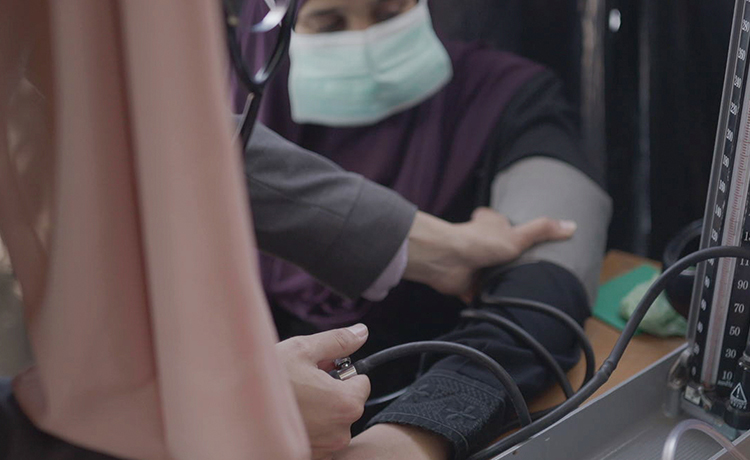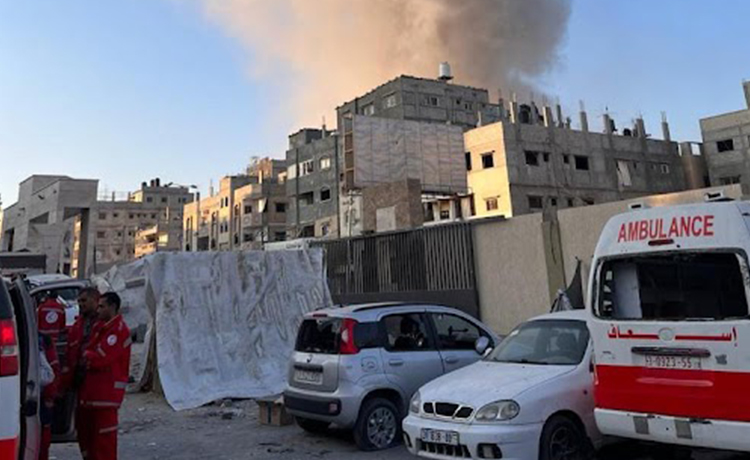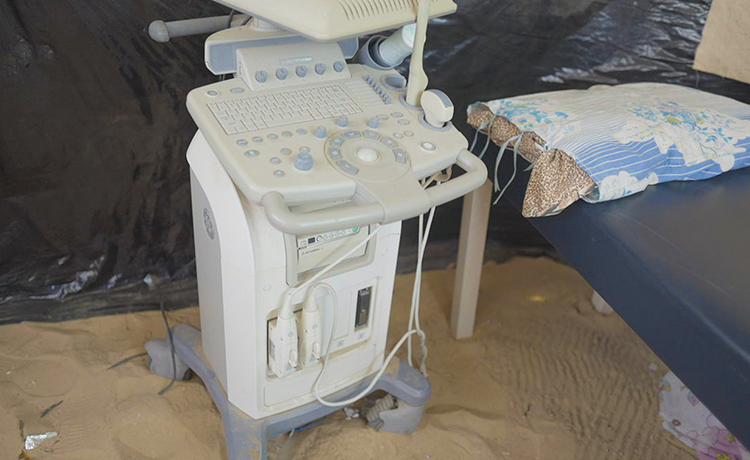News
“Gaza is at breaking point”: Health workers and patients describe an unfolding catastrophe in Rafah
- 14 March 2024
News
RAFAH, The Gaza Strip – Dr. Mohamed Ragab used to work as a gynaecologist and obstetrician at the Nasser Medical Complex in Khan Younis, in southern Gaza. But after the health centre was bombarded in February 2023, up to 70 women a day now visit the doctor in a tent set up at a camp for 40,000 displaced people in Rafah.
“This might be the only place in the displacement camps where we can provide antenatal and pregnancy care,” Dr. Ragab told UNFPA, the United Nations sexual and reproductive health agency, which has helped equip Dr. Ragab with basic supplies.
With only the overcrowded Al-Helal Emirati Maternity Hospital still able to offer health services in the area, many pregnant women simply have nowhere else to turn. “Our prenatal centre is based in the sand: We need to be in the camp to be closer to the women and relieve pressure on the hospital,” explained Dr. Ragab. “We don’t only diagnose, we also provide medications and treatment.”
Just 12 out of 36 hospitals across Gaza remain partially functional, and only two are providing maternity services; yet in the throes of this chaos and catastrophe, some 180 women are giving birth every day. Haneen, 30, is eight months pregnant with her third child and has been displaced five times since October. She saw Dr. Ragab for a prenatal check-up – her second throughout her entire pregnancy.
“I am very tired; a pregnant woman is naturally tired during pregnancy while in her own home, let alone with life like it currently is,” she told UNFPA. “The lack of bathrooms and essential items – it all makes the whole situation unbearable.”
Since the escalation of hostilities in October 2023, around 1.7 million people have been displaced in Gaza, with an estimated 1.5 million crowded into Rafah. As food, fuel, clean water and medical supplies run desperately low, disease, illness, severe hunger and acute malnutrition are rife, particularly among the more than 155,000 pregnant and breastfeeding women and their newborns.

Infections spread as medications dwindle
For pregnant women and new mothers, safe pregnancy, labour and delivery are just one hurdle to overcome. Conditions at the temporary camps they reside in are squalid; where available, bathrooms are shared among hundreds of people and lack clean water or hygiene products.
This means the risk of infection and communicable disease spreading has soared, said Dr. Ragab. “The majority of cases we deal with are urinary tract infections from the lack of clean water. Some women have gynaecological infections and chest infections from being exposed to the cold,” he said.
“The greatest risks they face are from diseases such as Hepatitis A, which have spread widely. A pregnant woman is fragile; she is more vulnerable. She may become infected very quickly or her condition can deteriorate easily”
With just a fraction of the needed food, water, medicine and critical health supplies reaching the people of Gaza, illnesses can quickly become life threatening. “There is a shortage of important medications for women, like Clexane or Heparin, that should be available and can save lives. I am supposed to provide these medications to women, but I can't,” said Dr. Ragab.

Fighting the odds to reach people in peril
Where possible, UNFPA is providing supplies to support the sexual and reproductive health needs of Gaza’s women and girls. Teams of health staff have been deployed to provide antenatal and postnatal care to pregnant and breastfeeding women at shelters in Deir al-Balah and Rafah, and together with partners UNFPA has so far supported over half of all births – 21,000 – in Gaza since the war began.
While UNFPA is delivering vital medicine and deploying health teams where accessible, for too many women, this support is simply impossible to reach in time. “I think of myself as someone who sees a drowning person and is trying to provide them with a life jacket,” said Dr. Ragab.

Tens of thousands of maternity, dignity, menstrual hygiene and reproductive health kits have also been distributed and psychosocial counselling and gender-based violence awareness sessions are being held, particularly aimed at young people and women who are most at risk of abuse.
As the conflict grinds on, access is increasingly fraught and obstetric emergencies and premature births are surging. After a recent visit to the Rafah’s Al-Amal Hospital, UNFPA’s Head of Office in Gaza, Judith Starkulla, described scenes of “bombed-out ambulances and badly damaged hospitals – but still women sought medical assistance and gave birth.”
“Hospitals are not places of hope anymore, nor of refuge or care – we cannot continue like this,” she said. “Gaza is at breaking point, and it will break very soon.”